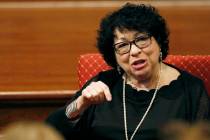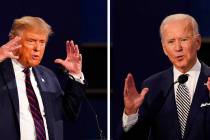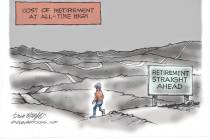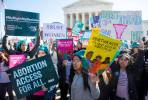If you don’t know it’s legal, it can’t hurt you
Ignorance is a virtue. It will keep us pure in thought and body.
Thank you, state of Nevada, for delivering us into blissful morality. Now, please continue to gamble, drink and watch the topless dancers.
Senate Majority Leader Harry Reid's grandstanding call to ban brothels got the headlines last week. Pushed to the back pages was news that the U.S. Supreme Court had refused to hear an ACLU appeal of the state's ban on advertising of legal brothels in jurisdictions where the practice is not legal.
We may continue our legislatively imposed hypocrisy.
As the law now stands, it is legal for outcall and escort services, which are nothing more than fronts and facades for illegal prostitution, to openly advertise on billboards and those garish and annoying little cards flipped at locals and tourists as we navigate the crowded Strip. But! It is illegal for legal brothels from neighboring counties to tout their services in any way, anywhere in Clark County, where prostitution is putatively illegal.
Plaintiff and brothel owner Bobbi Davis rather succinctly told a Review-Journal reporter after the ruling came down, "Escorts get to put up billboards, but I can't even advertise for a housekeeper in (the Las Vegas Review-Journal). That's how stupid the law is.
"The courts want to punish a legal business in favor of (pimps) trafficking in 13- and 14-year-old girls, beating their women and getting them hooked on drugs and then they'll give people HIV. The Supreme Court has said we shall let this happen."
The law of the land is now a 9th U.S. Circuit Court of Appeals ruling upholding the state law. It reads more like a sermon than an opinion, concluding the state has a paternalistic right to prevent the "commodification of sex," whatever that means.
The question isn't whether the state can or should prohibit, regulate or legalize the practice of prostitution. It can. The question is whether the state can gag free speech in a senseless and futile effort to keep citizens and tourists ignorant.
The failure of the high court to grant certiorari in this case flies in the face of other rulings on commercial advertising, which have upheld the First Amendment right to advertise booze, pharmaceuticals and gambling.
In her ruling, 9th Circuit Judge Marsha Berzon mentioned but then skirted those rulings and, in fact, defied them with this sleight of logic: "Common sense counsels that advertising tends to stimulate demand for products and services. Conversely, prohibitions on advertising tend to limit demand."
Advertising also tends to give factual information that free individuals can use to make judgments about how they wish to behave, what they wish to buy or sell, eat or drink.
Justice Clarence Thomas wrote in the case of 44 Liquormart that the courts were asked to "weigh incommensurables -- the value of knowledge versus the value of ignorance -- and to apply contradictory premises -- that informed adults are the best judges of their own interests, and that they are not."
Thomas went on to stress the "importance of free dissemination of information about commercial choices in a market economy; the antipaternalistic premises of the First Amendment; the impropriety of manipulating consumer choices or public opinion through the suppression of accurate 'commercial' information "
A local federal judge, James Mahan, also took a far more realistic view of the First Amendment when he declared the brothel ad ban unconstitutional in a 2007:
"Defendants have posited that advertising of licensed brothels in counties that by statute or county option do not have legal prostitution will promote and increase illegal prostitution in those counties. ... Defendants' suggestion is, at best, highly speculative. The opposite effect is at least as plausible if not more so. It is more likely that tourists who are unclear about what is legal and what is not will be better able to discern, through truthful advertising, which establishments are lawful."
Justice Harry Blackmun addressed a similar concern in his ruling overturning a Virginia ban on advertising prices of pharmaceuticals, writing, "on close inspection it is seen that the State's protectiveness of its citizens rests in large measure on the advantages of their being kept in ignorance. The only effect the advertising ban has on (a pharmacist) is to insulate him from price competition and to open the way for him to make a substantial, and perhaps even excessive, profit in addition to providing an inferior service."
Maybe the brothels should have tried to advertise their price lists.
Thomas Mitchell is senior opinion editor of the Review-Journal. He may be contacted at (702) 383-0261 or via e-mail at tmitchell@ reviewjournal.com. Read his blog at www.lvrj.com/blogs/mitchell.























